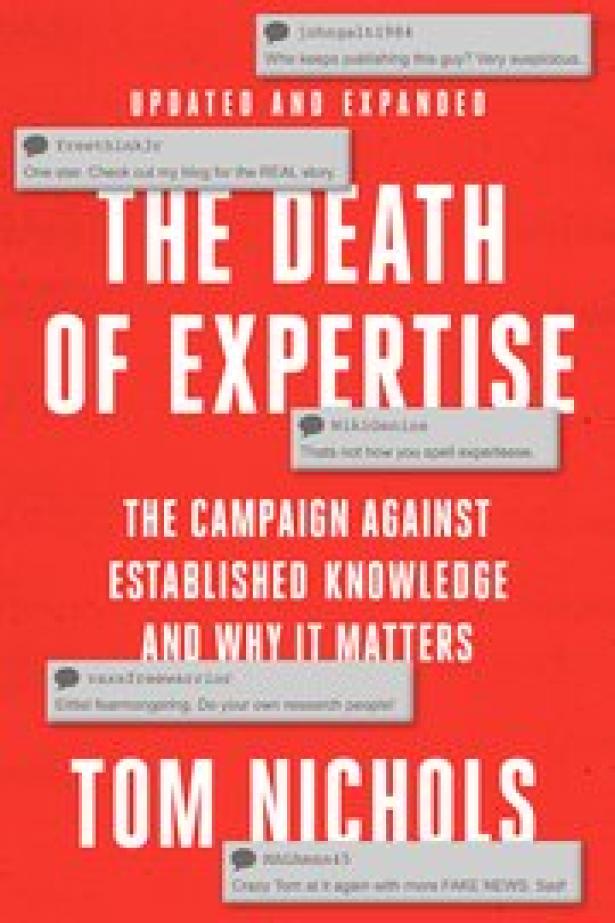The Death of Expertise
The Campaign Against Established Knowledge and Why It Matters
By Tom Nichols
Oxford University Press
ISBN: 9780197763834
Donald J. Trump’s taste for advisers with little or no government experience; his selection of cabinet members like Scott Pruitt and Rick Perry, who have expressed outright hostility to the agencies they now oversee; and the slow pace of making senior-level appointments in high-profile departments like State, Treasury and Homeland Security — all speak to the new president’s disregard for policy expertise and knowledge, just as his own election victory underscores many voters’ scorn for experience.
This is part of a larger wave of anti-rationalism that has been accelerating for years — manifested in the growing ascendance of emotion over reason in public debates, the blurring of lines among fact and opinion and lies, and denialism in the face of scientific findings about climate change and vaccination.
“Americans have reached a point where ignorance, especially of anything related to public policy, is an actual virtue,” the scholar Tom Nichols writes in his timely new book, “The Death of Expertise.” “To reject the advice of experts is to assert autonomy, a way for Americans to insulate their increasingly fragile egos from ever being told they’re wrong about anything. It is a new Declaration of Independence: No longer do we hold these truths to be self-evident, we hold all truths to be self-evident, even the ones that aren’t true. All things are knowable and every opinion on any subject is as good as any other.”
“The Death of Expertise” turns out to be an unexceptional book about an important subject. The volume is useful in its way, providing an overview of just how we arrived at this distressing state of affairs. But it’s more of a flat-footed compendium than an original work, pulling together examples from recent news stories while iterating arguments explored in more depth in books like Al Gore’s “The Assault on Reason,” Susan Jacoby’s “The Age of American Unreason,” Robert Hughes’s “Culture of Complaint” and, of course, Richard Hofstadter’s 1963 classic, “Anti-Intellectualism in American Life.” Nichols’s source notes are one of the highlights of the volume, pointing the reader to more illuminating books and articles.
Nichols reminds us how a “resistance to intellectual authority” naturally took root in a country, dedicated to the principles of liberty and egalitarianism, and how American culture tends to fuel “romantic notions about the wisdom of the common person or the gumption of the self-educated genius.” (Though the country, it should also be remembered, was founded on the Enlightenment principles of reason and an informed citizenry.)
Nichols argues that the “protective swaddling environment of the modern university infantilizes students,” and suggests that today’s populism has magnified disdain for elites and experts of all sorts, be they in foreign policy, economics, even science.
Trump won the 2016 election, Nichols writes, because “he connected with a particular kind of voter who believes that knowing about things like America’s nuclear deterrent is just so much pointy-headed claptrap.” Worse, he goes on, some of these voters “not only didn’t care that Trump is ignorant or wrong, they likely were unable to recognize his ignorance or errors,” thanks to their own lack of knowledge.
Citizens of all political persuasions (not to mention members of the Trump administration) can increasingly live in their own news media bubbles, consuming only views similar to their own. When confronted with hard evidence that they are wrong, many will simply double down on their original assertions. “This is the ‘backfire effect,’” Nichols writes, “in which people redouble their efforts to keep their own internal narrative consistent, no matter how clear the indications that they’re wrong.” As a result, extreme views are amplified online, just as fake news and propaganda easily go viral.
Today, all these factors have combined to create a maelstrom of unreason that’s not just killing respect for expertise, but also undermining institutions, thwarting rational debate and spreading an epidemic of misinformation. These developments, in turn, threaten to weaken the very foundations of our democracy. As Nichols observes near the end of this book: “Laypeople complain about the rule of experts and they demand greater involvement in complicated national questions, but many of them only express their anger and make these demands after abdicating their own important role in the process: namely, to stay informed and politically literate enough to choose representatives who can act on their behalf.”


Spread the word